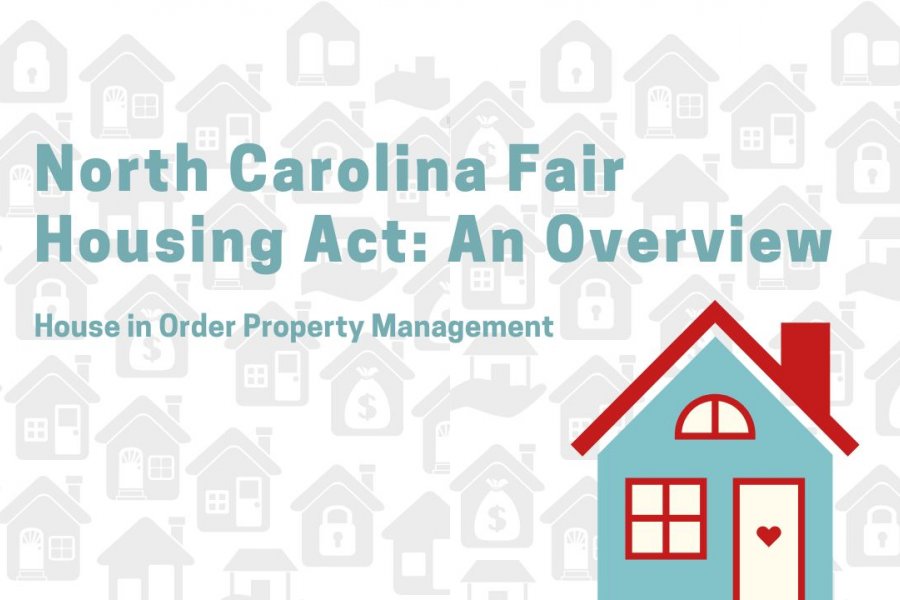
Exploring the basics of Fair Housing Law in North Carolina is vital if you own and operate a rental property. Understanding the rights of your tenants or yourself as the landlord, making sense of Fair Housing Laws that protect against discrimination, and navigating the ins and outs of this legal topic is essential for those operating a rental business in the state.
In this blog post, we at House in Order Property Management will provide an overview of the key components behind the laws of fair housing in North Carolina so that you can understand your rights fully and run your business in accordance with them.
What Fair Housing Means
The Fair Housing Act (FHA) is a federal law that prohibits housing discrimination on the basis of race, color, religion, national origin, sex, disability, and familial status. In North Carolina, this act also includes sexual orientation and gender identity.
The Federal FHA applies to all aspects of real estate and housing matters including renting or purchasing a North Carolina property as well as advertising practices and lending requirements.
What Does the North Carolina Fair Housing Act Cover?
The North Carolina FHA prohibits discrimination in housing matters on the basis of a person's protected classes. Under these fair housing laws, it’s illegal to refuse to rent to someone based on any of their protected classes, it's also illegal for landlords to set different terms and conditions for tenants in a discriminatory manner.

Additionally, this law applies to all real estate transactions such as appraisals and rental advertisements. In addition to providing protections against discrimination in housing offerings, North Carolina fair housing laws also have requirements regarding accessibility for people with disabilities, creating equal opportunities for everyone.
As a landlord, you must provide reasonable accommodations for persons with physical or mental impairments that limit their ability to use public services or enjoy their living space with equal opportunity. For example, if a tenant with a disability needs access to the front door of their building and there are no ramps, then to offer equal housing opportunities, the landlord must provide an appropriate ramp for them.
What Types of Properties Does the Fair Housing Act Cover?
The FHA applies to any real estate transaction involving the sale, rental, or financing of dwellings. This includes apartments and single-family homes, duplexes, townhouses, condominiums, cooperatives, and other kinds of housing.
The Federal FHA prohibits discrimination in renting all types of residential properties and also covers mobile homes, manufactured housing, and other types of residential property designed as housing spaces. In addition to protecting buyers and renters from discrimination, it also prohibits discriminatory practices such as predatory lending and blockbusting.
What Types of Properties Are Exempt from the Fair Housing Act?
The Federal Fair Housing Act is designed to protect individuals against bias when it comes to accessing housing and services related to housing. However, not all types of properties are subject to the regulations established by this Act.

Properties owned or operated by religious organizations or private clubs that limit occupancy to their members are typically exempt from the Federal Fair Housing Act. Additionally, single-family homes that are sold or rented without the use of real estate agents or brokers may also be excluded from the protections of Fair Housing Law.
Finally, an owner-occupied dwelling with no more than four units, where one unit is housing the owner, are also typically exempt.
What are Examples of Violations of the Fair Housing Act?
Common violations of the Fair Housing Act include refusing to rent or sell homes to someone because of their actual or perceived race, color, national origin, religion, sex, familial status, and disability. Other examples of housing bias include:
- Discriminating against tenants based on their source of income (e.g., Section 8 vouchers).
- Steering tenants to certain neighborhoods based on their race, color, national origin, or other protected classes.
- Advertising housing opportunities only in publications meant for one particular group of people.
- Charging higher security deposits or rent based on someone’s protected class.
- Implementing policies that discriminate against families with children.
- Refusing reasonable modifications to the rental for tenants with disabilities.
- Engaging in retaliatory actions, like eviction, against tenants who file fair housing complaints.
How Can North Carolina Landlords Avoid Discrimination Claims?
In North Carolina, there are several key steps landlords can take to avoid potential housing discrimination claims under the laws of fair housing.

Firstly, it’s important for landlords to make sure that they do not deny housing opportunities on the basis of protected classes such as race, color, religion, sex, national origin, familial status, or disability. It’s also important for landlords to ensure that they do not discriminate in terms of the advertising, leasing, and financing of rentals.
When advertising a rental, a landlord should avoid phrases or language that could be interpreted as unlawfully discriminatory. Additionally, when considering rental applications from prospective tenants, it’s important to apply the same criteria to all applicants and not make decisions based solely on an individual’s protected characteristics.
Finally, property owners should be aware of their obligations when it comes to accommodating reasonable requests by tenants with disabilities, such as providing accessible units or making structural modifications to existing units.
To ensure you are following the rules and regulations of fair housing, consider hiring a property manager. A professional property manager can offer experience and expertise in human relations, so you can feel confident that you and your rental are up to date on all applicable laws.
Final Words
The FHA protects individuals from discrimination based on a person's protected classes. Violations of this law can be very costly for rental property owners. It’s important to understand how common violations of this law can occur so that you, as the landlord, can properly comply and protect yourself.
You should also stay informed of landlord-tenant laws and regulations for breaking a lease early. If you need any help understanding these or managing your rental properties contact House In Order Property Management today!
Disclaimer: This blog should not be used as a substitute for legal advice from a licensed attorney in your state. Laws change, and this post might not be updated at the time of your reading. Please contact us for any questions you have in regard to this content or any other aspect of your property management needs.
